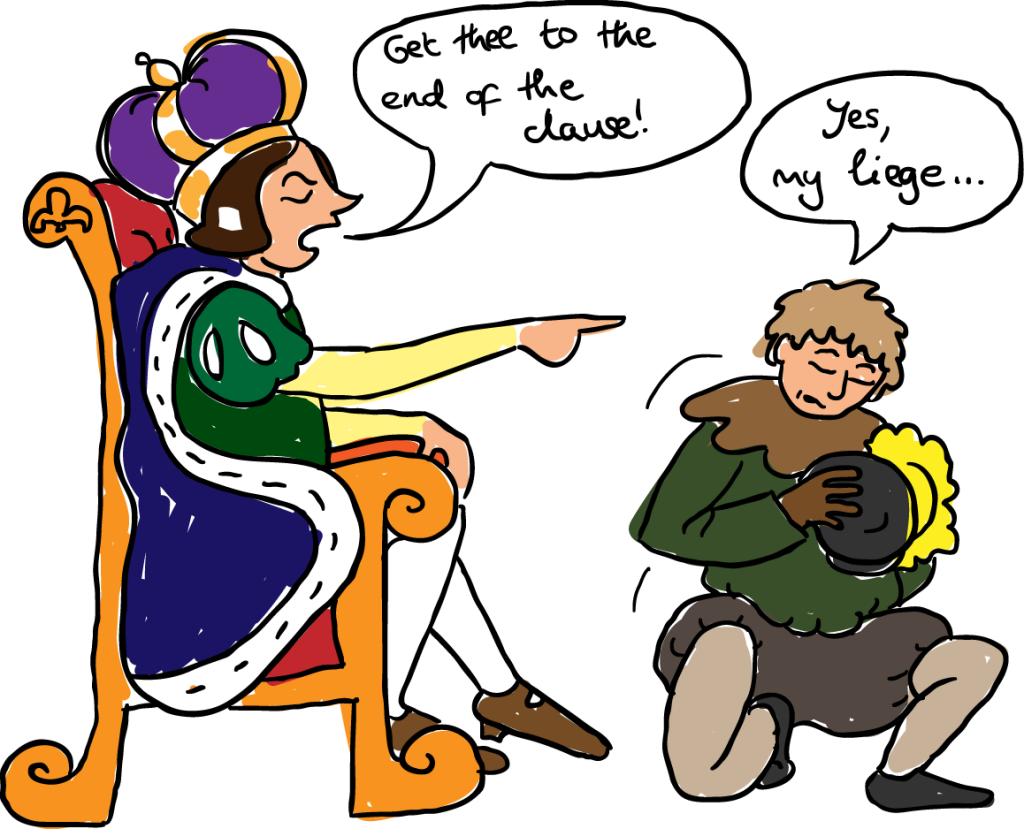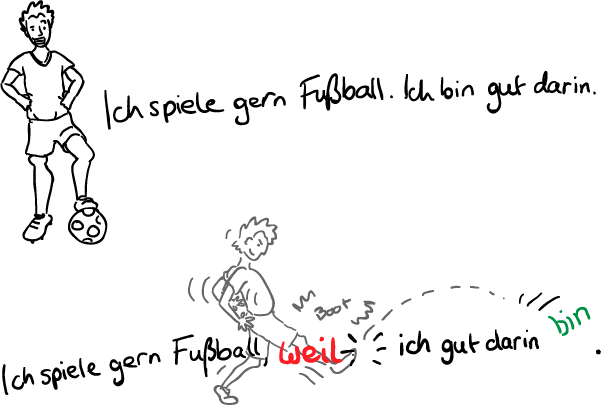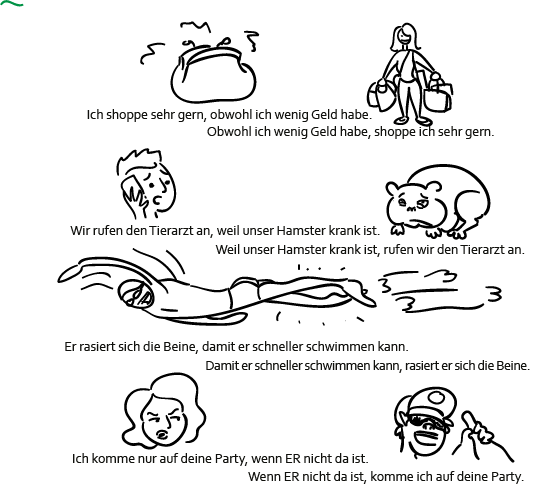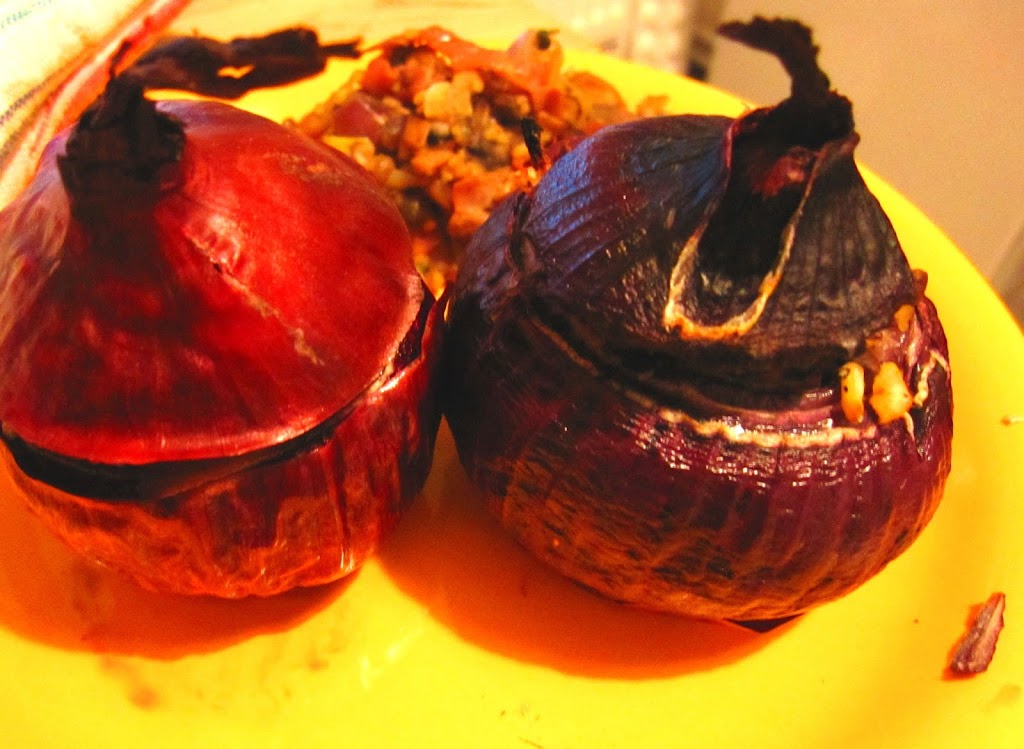In Part 1 we took a look at co-ordinating conjunctions and what I call ‘mixed conjunctions’. As I mentioned, these conjunctions could also be seen as ‘easy’ and ‘medium’ conjunctions, like difficulty levels in Guitar Hero: for ‘easy’ you play with just three fingers, for ‘medium’ you play with four, and for ‘hard’ you have to play chords with your forehead while solving physics equations that flash up on the screen…or something, I haven’t played that game in a while. Anyway – now it’s time for us to dive into the ‘hard’ conjunctions: subordinating conjunctions.
Don’t panic, though. Subordinating conjunctions sound a lot scarier than they actually are; once you’re used to the way they work, it’s dead simple. First of all, let’s get acquainted with all the most common ones which you’re going to need in your Germanical toolbelt:
weil – because
obwohl – although
dass – that (i.e. ‘he said that you’re an ass’)
da – because, as
bevor – before
nachdem – after
ob – whether
als ob – as if
damit – so that
wenn – if, when, whenever
als – when (used for past events – we’ll come back to these last two later. Click here to spring straight to that section.)
As you can probably tell, these are some super-useful words right here, so you definitely want to learn all of these off by heart, no question. Tattoo them on your love handles if you need to, just as long as you learn them and learn ’em good.
Word order with subordinating conjunctions
Let’s build a complex sentence out of two clauses using a subordinating conjunction.
Ich spiele gern Fußball.
I like playing football.
Ich bin gut darin.
I’m good at it. (n.b. useful to remember that in German you are good ‘in’ something rather than good ‘at’ something)
First things first: when you’re using a subordinating conjunction to join up the clauses, you need to pop in a comma at the end of the first clause:
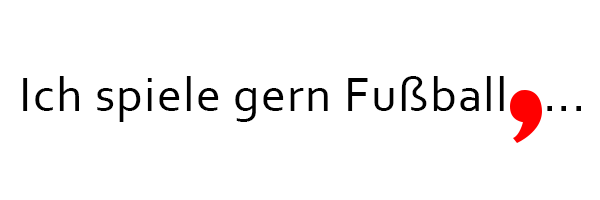 Slightly exaggerated here, but you get my drift. Then, after the comma, comes the conjunction. Here we’ll use ‘weil’ – ‘I like playing foolball because I’m good at it.’ And this is what happens:
Slightly exaggerated here, but you get my drift. Then, after the comma, comes the conjunction. Here we’ll use ‘weil’ – ‘I like playing foolball because I’m good at it.’ And this is what happens:
The subordinating conjunction boots the verb in the second clause all the way to the end of the clause. Here are some more examples of this happening:
Sie gießt ihre Pflanzen. Sie verlässt das Haus.
Sie gießt ihre Pflanzen, bevor sie das Haus verlässt.
Ich nehme an der Demo teil. Ich habe nichts gegen Atomenergie.
Ich nehme an der Demo teil, obwohl ich nichts gegen Atomenergie habe.
See? Dead easy. The verb always goes to the end of the clause. If you’re working with a clause which contains more than one verb or a past participle, the rule still applies – the active verb (i.e. the one which is being carried out by the subject and is conjugated) still goes to the end of the clause:
Wir haben uns nicht wohl gefühlt, nachdem wir eine ganze Flasche Gin getrunken haben. (past tense)
Sie liest sein Tagebuch, damit sie seine Gefühle besser verstehen kann. (modal verb)
But the fun doesn’t stop there. We can also begin a sentence with a subordinating conjunction, which is often helpful for emphasis or slight changes in the way you want to express your message:
See how the subordinating conjunction still sends the verb to the end of the clause? And take a look at the second clause: see how the verb comes at the very start, right after the comma? That’s because the whole first clause has now taken first position, and so what absolutely must follow is the verb, which always wants to be in second position. Generally, grammacologists tend to simplify this whole idea down to the much more catchy ‘Verb comma verb rule’: when you start your sentence with a subordinating conjunction, the verbs hang on either side of the comma separating the clauses. The clause containing the subordinating conjunction doesn’t change, in essence; all we’re changing is where it stands in relation to the other clause.
The last example shows how the different structures allow us to change the meaning and expression of what we’re saying – namely that the first option in this instance sounds even more bitchy than the second.
So what’s the deal with wenn and als?
As you may have noticed in the vocab list above, wenn and als can both mean ‘when’, but they have weird and different meanings. Let’s break it down:
Wenn
Wenn means ‘if’ and also ‘when’, also in the sense of ‘whenever’ (i.e. a recurring or conditional incident); for example, I would use ‘wenn’ in all of the following sentences:
If he comes home before me hopefully he will do the dishes.
She has an emotional breakdown whenever she hears One Direction.
When I get my Master’s degree I’ll have much better job opportunities.
When her dog sees her, he always runs straight to the door to say hello.
(Bonus points: translate these sentences into German and email me your answers!)
Als
Als also means ‘when’, but ONLY in the context of past happenings; if it helps, you can think of it as the ‘once upon a time’ conjunction. Any time you are recounting something that has already happened, whether it was yesterday or three years ago, you need to use als. I would use als in sentences like this:
When I went to the shops on Tuesday I tripped over a chihuahua.
She called the vet immediately when she saw her sick hamster.
When we got to know him last year he had blue hair.
I read a lot of books when I took the train to work.
See how, in that last example, the ‘als’ is actually really useful because it very often carries over the idea of ‘used to’, which has no direct translation in German – in English the sentence feels more comfortable as ‘I read a lot of books when I used to take the train to work’ but in German you don’t need that ‘used to take’ flimflam as long as you’ve got als in there doing the heavy lifting.
(Bonus points for these four sentences too! Email your answers to ampelfrau[at]gutenmorgenberlin[dot]com!)
I’m sure it’s obvious from this lesson how useful and important subordinating conjunctions are, even though they require a bit more elbow grease than the other conjunctions. If you learn all this by heart you’ll be a great step further towards feeling comfortable with German word order, and with the language in general.
